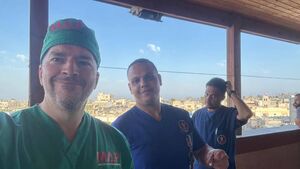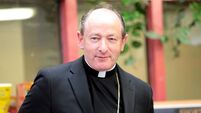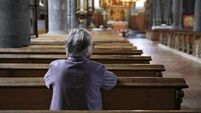Editorial: Waterford trauma surgeon bears witness to genocide

Dr Morgan McMonagle with colleagues in Gaza. Photo: The Irish Times
Dr Morgan McMonagle, a trauma surgeon at University Hospital Waterford, gave a talk at SETU last week about his work in a tent hospital in Gaza. His first-person account of his experience in Gaza is nothing short of horrifying.
It is as we have been seeing for months and months now on our social media feeds, direct first-person accounts from Palestinian people enduring the most abhorrent, relentless campaign of genocide.
The images just keep coming. This week, one of the photos that stopped comfortable Irish people in their social media scrolling during the weekend was of the dead bodies of two siblings. Their lives snuffed out, their vulnerable bodies frozen in time now before a sheet was drawn over their pale faces, all that could have been for them gone in the instant of yet another unnecessary and barbaric attack.
Dr McMonagle has worked in countless trauma settings, tending to soldiers injured in the Iraq war, in London following the 2017 terrorist attacks and in Ukraine after the Russian invasion.
However, his experience in Gaza was, as described by reporter Libby Marchant in her coverage of his talk at SETU, on "an entirely different level".
Just as the first-person reports from social media bear witness to, he also could hear the constant noise of the drones, the constant noise of bombardment, describing on occasion the whole wall of the building he was staying in shaking. Bombs went off every single night that Dr McMonagle worked in Gaza, sending more and more injured men, women and children - those that managed to survive - to the doors of a hospital which itself was not safe from attack.
Dr McMonagle told the audience about how Israeli forces took over the newest wing of Nassar hospital for a few weeks and when they were finished, they burnt the entire wing down, “just because they can”.
For comparison, think about how many years Waterford people spent raising funds for the construction of the Dunmore Wing and Palliative Care Unit at University Hospital Waterford.
Perhaps the most odious reality Dr McMonagle came face to face with was the lack of pediatric ventilators. There are only five for the entire Gaza Strip.
“Israel won’t allow ventilators in. They said it can be reshaped into an explosive device. You can make any arbitrary excuse you want,” Dr McMonagle told those gathered at SETU Arena.
On social media, a mother puts up videos of her daughter cooking in a tent. Her daughter is three years old. Some might wonder why her mother records and disseminates these videos of her young child. But there is a resilience and a humanity in these stories. Amid the helplessness, this mother provides one of the only outlets she can for her child. She teaches her to cook. There is no Smyths toy shop to take her for a treat, no cafe with warming hot chocolate and marshmallows. There is only the simple entertainment of fashioning play out of the basic necessities of life. Trying to stay nourished and warm as winter encroaches.
“It’s impossible for parents to keep their children warm in tents," Dr McMonagle says. "There’s no heating, there’s no sanitation, there’s no running water, there’s no sewage, there’s no garbage collection.”
It is a horror that continues day after day after day.
The first-person witness account of Dr McMonagle is essential. His bravery in making himself available to work in Gaza is commendable. We, in turn, must also keep engaging, listening and speaking up.
As the twinkly lights of Christmas sparkle in Waterford, we cannot close our eyes and our minds to Gaza and the Palestinian people.






